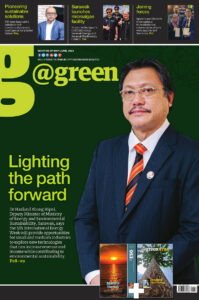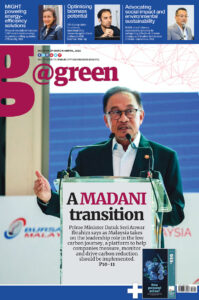BCSD Malaysia assists companies to tackle climate change
Mitigating climate change requires collective effort. In doing so, both industry players and individuals must play their roles effectively. Collaborations between political will and companies will bring Malaysia closer to carbon neutrality.
According to Roberto Benetello, Company Director and Executive Director of Business Council for Sustainable Development (BCSD) Malaysia, Malaysia’s companies are committed to climate change action.

Benetello revealed that based on a survey conducted by Ernst & Young, over 60 per cent of the 100 public listed companies (PLCs) in Malaysia reported their commitment to climate action. He said the commitment also included stepping up disclosures on climate-related risks in governance, strategy and risk management.
“For example, in October last year, PETRONAS declared that it would be carbon neutral by 2050. It is the first time for an oil and gas company to set its climate zero targets in Asia. So, it’s encouraging,” said the Benetello, highlighting that it is inevitable for Malaysia to embrace nett-zero carbon emission.
Policies to facilitate energy transition
Benetello opined that many policies could be implemented to facilitate Malaysia’s energy transition.
“Let’s look at the energy intensity. Energy intensity is a measure that indicates how well energy is utilised to create wealth for the country.
“It is projected that Malaysia’s final energy intensity will continue to rise. It is not so good. That’s why there must be efforts to ensure energy efficiency is improved. If the current trend continues, Malaysia will spend more than necessary to sustain the energy needs for the economy,” explained Benetello, adding that it is essential to have policies that could tackle energy efficiency issues without sacrificing public welfare.
He added Malaysia should also look into policies in electric vehicles and believed there should be more targets for their adoption. Benetello highlighted the current target for electric cars adoption was relatively low and would not directly impact the overall energy consumption in the transportation sector.
Additionally, Benetello mentioned the efficiency issue of coal-fired power plants should also be addressed at the policy level.
“Clear and effective roadmap, as well as an energy action plan, must be developed to reduce the energy and carbon intensity,” he said.
Without significant policies to facilitate the energy transition, Benetello stated Malaysia would be a bit off target in realising its pledge to reduce 45 per cent carbon intensity per unit of GDP.
“However, if we have good policies introduced, there is a good chance that Malaysia will meet this objective of CO2 reduction.”
Companies are the prosumers of energy
Benetello stated companies and businesses play a significant role in the reduction of CO2 emissions.
He said: “Companies need to take this energy transition seriously. They need to look into becoming or getting to at least a nett-zero GHG emissions.”
He believed the transition would not be easy as companies need to look thoroughly into what they do internally and their relation to the external environment. However, he stated the situation also allowed companies to rethink the way they sourced and consumed energy.
“Many companies right now are moving from being consumers of energy to being prosumers, a mix between producers and consumers. For example, many of them have decided to utilise the roofs of their manufacturing plants or facilities to install solar panels,” shared Benetello.
Benetello then explained companies must look into the three types of CO2: Scope 1, Scope 2 and Scope 3 emissions. He mentioned that Scope 3 emission would be quite a challenge for companies as it required sophisticated approaches for companies to talk to all stakeholders in the value chain.
“That’s where we come into play. As a sustainability organisation, we are a CEO-led non-profit organisation. Still, we offer a lot of education, training and events to educate and help our members in this transition.”
Aside from being a platform that gathers and encourages
collaboration between stakeholders, Benetello emphasised that BCSD Malaysia was affiliated to the World Business Council for Sustainable Development (WBCSD). He shared that the organisation produced many reports, methodologies, and tools that BCSD Malaysia could leverage and offer to Malaysian companies.
Carbon Border Adjustment Mechanism and COP26
Benetello then shared his opinion regarding the Carbon Border Adjustment Mechanism (CBAM), which the European Union (EU) pushed. Since CBAM was a new proposal and still at a proposal level, Benetello said he was still studying the mechanism.
“In principle, it’s a nice idea. But with everything like this, the devil is in the details,” he said.
He said the implementation must be done with the correct mechanisms avoiding a high level of bureaucracy, red tape, documents, and reliability of the information or else the system will become unfair. Benetello highlighted all these climate
action initiatives needed to be equitable.
He then mentioned the 2021 United Nations Climate Change Conference (COP26) was an important platform that would feature essential discussions. He hoped carbon taxation and just energy transition would be discussed during the conference.
– @greenXtra









